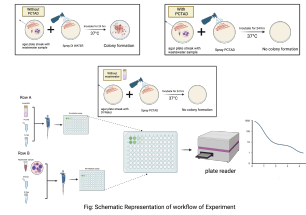Rapid Bacterial Detection in Wastewater via Colorimetric Analysis of PCTAD-Dye Copolymer — 51p — Manish Rayamajhi; Tim Hartman; Ying Deng, Ph.D.; Venkataramana Gadhamshetty, Ph.D.; Etienne Gnimpieba, Ph.D.
According to the CDC, waterborne pathogens cause an estimated 7.15 million illnesses, 118,000 hospitalizations, and 6,630 deaths annually, resulting in $3.3 billion in healthcare costs. To improve public health, we leveraged a novel antibacterial copolymer called PCTAD, combined with a dye, to quickly detect abnormally high wastewater bacteria concentrations. Escherichia coli, commonly found in animal intestines, is a key indicator
While most strains are harmless, some, like E. coli O157, can cause severe illness with symptoms such as bloody diarrhea, vomiting, and stomach cramps. As an assay for quick water testing, we hypothesized that as PCTAD reacts with wastewater bacteria, less free PCTAD will react with potassium iodide (KI) dye. This results in a liquid product color whose intensity is proportional to the concentration of free PCTAD. More intense color means less bacteria.
We tested our hypothesis using different PCTAD concentrations against a control group without microbes. As PCTAD concentration decreased with constant bacteria levels, color intensity diminished earlier in the dilution sequence compared to controls. This was quantified using a well plate in a plate reader and verified by agar plate assays for PCTAD efficacy and bacteria concentration.
Our study revealed an earlier color change in the PCTAD group compared to the control, indicating faster bacterial detection. Plate reader data showed decreasing light absorbance with higher PCTAD dilutions, although the experimental group maintained slightly higher absorbance than the control group, suggesting higher bacterial presence in wastewater samples. However, the detection limit was established at 106 CFU/ml, below which bacterial presence was undetectable due to complete elimination.

University of South Dakota
Etienne Gnimpieba, Ph.D.
 National Science Foundation RII Track-1 Project:Expanding Research, Education and Innovation in South Dakota
National Science Foundation RII Track-1 Project:Expanding Research, Education and Innovation in South Dakota